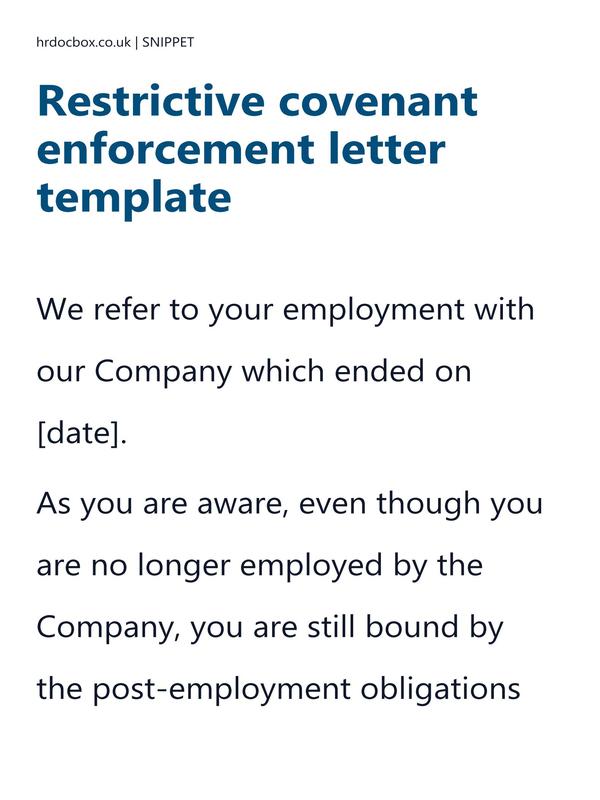Restrictive covenant enforcement letter template


Our Restrictive Covenant Enforcement Letter Template safeguards against violations, protecting business interests and maintaining contractual agreements.
If it is alleged that a former employee has breached a restrictive covenant, send this model letter to request them to provide written agremeent that they will cease.
- Includes Restrictive covenant enforcement letter template, plus 12 months’ access with all updates provided free of charge and notified to you.
- UK-specific accuracy.
- 326 words over 2 pages.
- Last updated 16/09/2025.
- Format: Word / plain text / email.
- Delivery: Instant download after purchase (no physical item).
- Access: Download link shown here after checkout.
- This Restrictive covenant enforcement letter template will SAVE you up to 1 hour drafting & research. Save cost. Reduce risk.
[Sender name]
[Sender address]
[date]
[Recipient name]
[Recipient address]
Dear [Recipient first name],
Restrictive covenants
We refer to your employment with our Company which ended on [date].
As you are aware, even though you are no longer employed by the Company, you are still bound by the post-employment obligations and restrictions set out in clauses (number) of your contract of employment, a copy of which is attached for your information.
We now have reason to believe that you are in breach of these post-employment obligations and restrictions, due to your following actions:
- [Specify actions which you believe have led to one or more of the restrictive covenants being breached]
We would advise you
This is a 30% preview of the Restrictive covenant enforcement letter template. For instant full access, purchase this item or a parent bundle.
Restrictive covenant enforcement letter template purpose
A restrictive covenant is a contractual agreement between an employer and an employee that restricts the employee's ability to compete with the employer or solicit the employer's clients or employees after leaving the company.
If a Company suspects that a former employee is acting in breach of those restrictive covenants, then the next step is for the Company to send a letter to remind them of their ongoing obligations. If the letter does not have the desired effect it may be necessary to take legal action.
Practical application of a Restrictive covenant enforcement letter template
- The Restrictive covenant enforcement letter template should be actioned / delivered as soon as the alleged breach has occurred.
- It is sent / delivered by an employer / HR team to an employee.
Compliance
Compliance
This Restrictive covenant enforcement letter template incorporates relevant UK laws and HR standards, including those listed below:
In general, to enforce a restrictive covenant, the employer must demonstrate that the covenant is reasonable in light of the employee's job duties and the legitimate business interests at stake, and that the employer has taken reasonable steps to protect those interests.
- Employment Rights Act 1996: Provides provisions for protecting confidential information, trade secrets, and intellectual property through restrictive covenants.
-
Equality Act 2010: Ensures that any restrictive covenants are not discriminatory and do not disproportionately impact protected groups.
-
Data Protection Act 2018: Ensures that any employee data used in the enforcement process is handled securely and in compliance with data protection regulations.
-
Common Law: The template should adhere to common law principles of reasonableness, fairness, and protecting legitimate business interests when enforcing restrictive covenants.
-
Employment Contracts: The letter template should align with the terms of the employment contract and any restrictive covenants mentioned therein.
To enforce a restrictive covenant, the employer must typically demonstrate that the covenant is reasonable in scope and duration, and is necessary to protect legitimate business interests such as confidential information, trade secrets, or customer relationships.
Timings
Timings
Follow these best practice actions to get the most from the Restrictive covenant enforcement letter template, guiding you before, during, and after implementation:
Instantly unlock with a purchase.
Instantly unlock with a purchase.
| Step | Description | Responsibility | Timing (Days from allegation) |
| 1 | Review Employment Contracts: Review employment contracts to identify relevant restrictive covenants. | HR / Legal Team | N/A |
| 2 | Gather Evidence: Collect evidence of the former employee's potential breach of restrictive covenants. | HR / Management Team | Day 1 |
| 3 | Legal Consultation: Seek legal advice to ensure that the potential breach is enforceable and justified. | HR / Legal Team | Day 3 |
| 4 | Prepare Enforcement Letter: Create a comprehensive Restrictive Covenant Enforcement Letter, stating the alleged breach, requested actions, and potential consequences. | HR / Legal Team | Day 5 |
| 5 | Issue the Enforcement Letter: After finalising the letter and obtaining approval, issue the Restrictive Covenant Enforcement Letter to the employee, officially notifying them of the potential breach and the company's intent to enforce the restrictive covenants. | HR / Management Team | Day 7 (Or as deemed appropriate |
Frequently Asked Questions about a Restrictive covenant enforcement letter template
Frequently Asked Questions about a Restrictive covenant enforcement letter template
-
Can I use the Restrictive covenant enforcement letter template in my small business?
Yes. The Restrictive covenant enforcement letter template is designed to be flexible and suitable for organisations of all sizes, including small businesses and charities. It follows UK employment law best practice, so even if you don't have an in-house HR team, you can confidently apply it.
-
Is the Restrictive covenant enforcement letter template compliant with 2026 UK employment law?
Absolutely. Like the Restrictive covenant enforcement letter template, all of our templates are drafted with the latest ACAS guidance and UK employment legislation in mind. We review and update them regularly, so you can be confident they remain compliant.
-
Can I customise the Restrictive covenant enforcement letter template for my organisation?
Yes, we highlight the areas of the Restrictive covenant enforcement letter template that you need to update with your own details, and where you need to make decisions to suit your situation. This saves you time and ensures that you meet best practice.
-
Do I get instant access to the Restrictive covenant enforcement letter template?
Yes. Once purchased, you'll be able to download the Restrictive covenant enforcement letter template instantly. Templates are provided in editable Word or Excel format so you can customise them easily, and in PDF format for easy sharing.
-
What if I need more help, not just a Restrictive covenant enforcement letter template?
If you're looking for broader support, we also offer toolkits and library bundles that include the Restrictive covenant enforcement letter template, along with other HR templates and policies for fully managing your situation. These may be more cost-effective if you need deeper advice.
-
Why should I use this Restrictive covenant enforcement letter template, and not AI to generate it?
The risk of using a free AI-generated template 'without review' includes your legal exposure, missing context, and no awareness of the wider process, whereas purchasing the Restrictive covenant enforcement letter template from us mitigates that risk.
